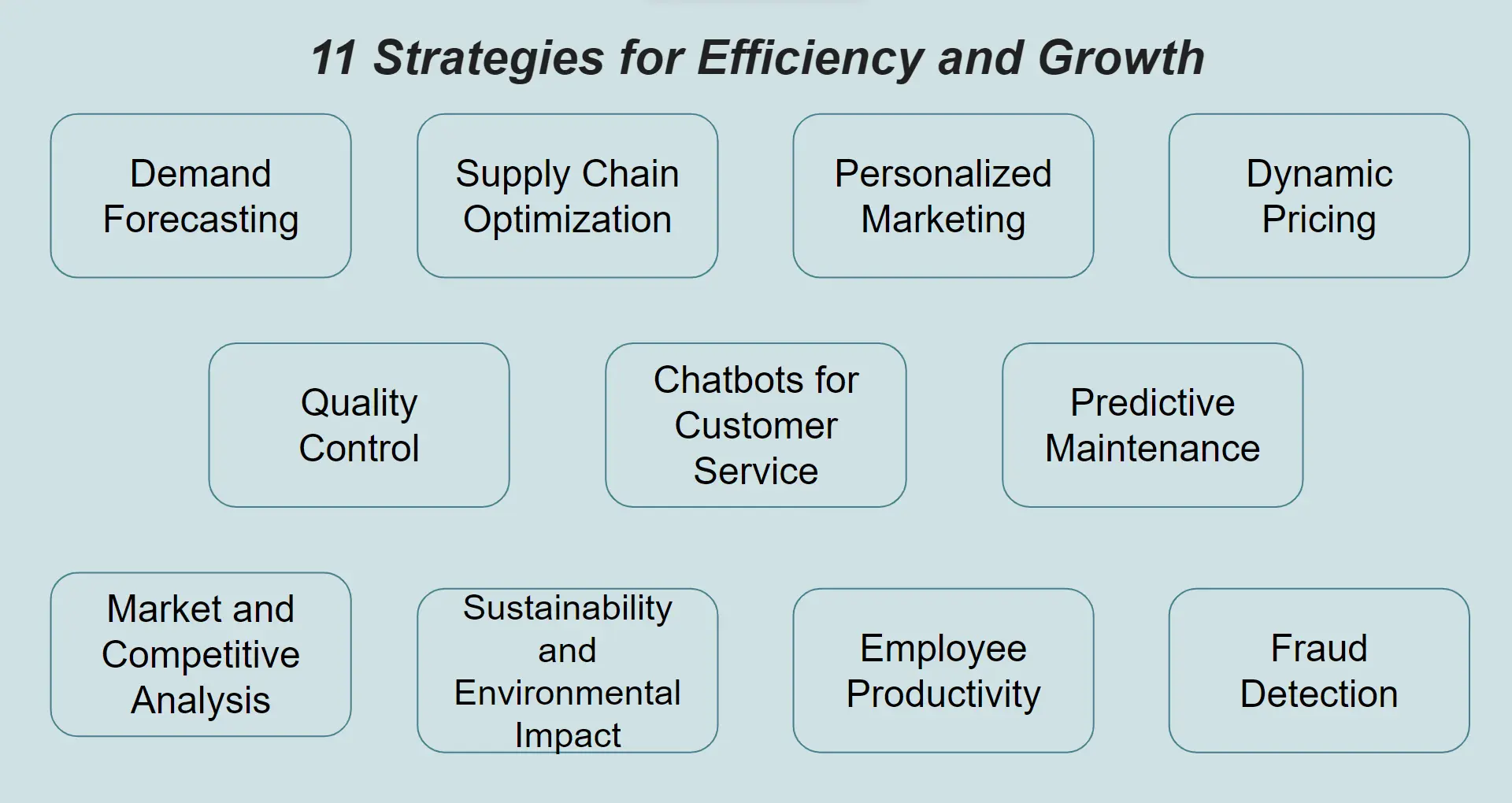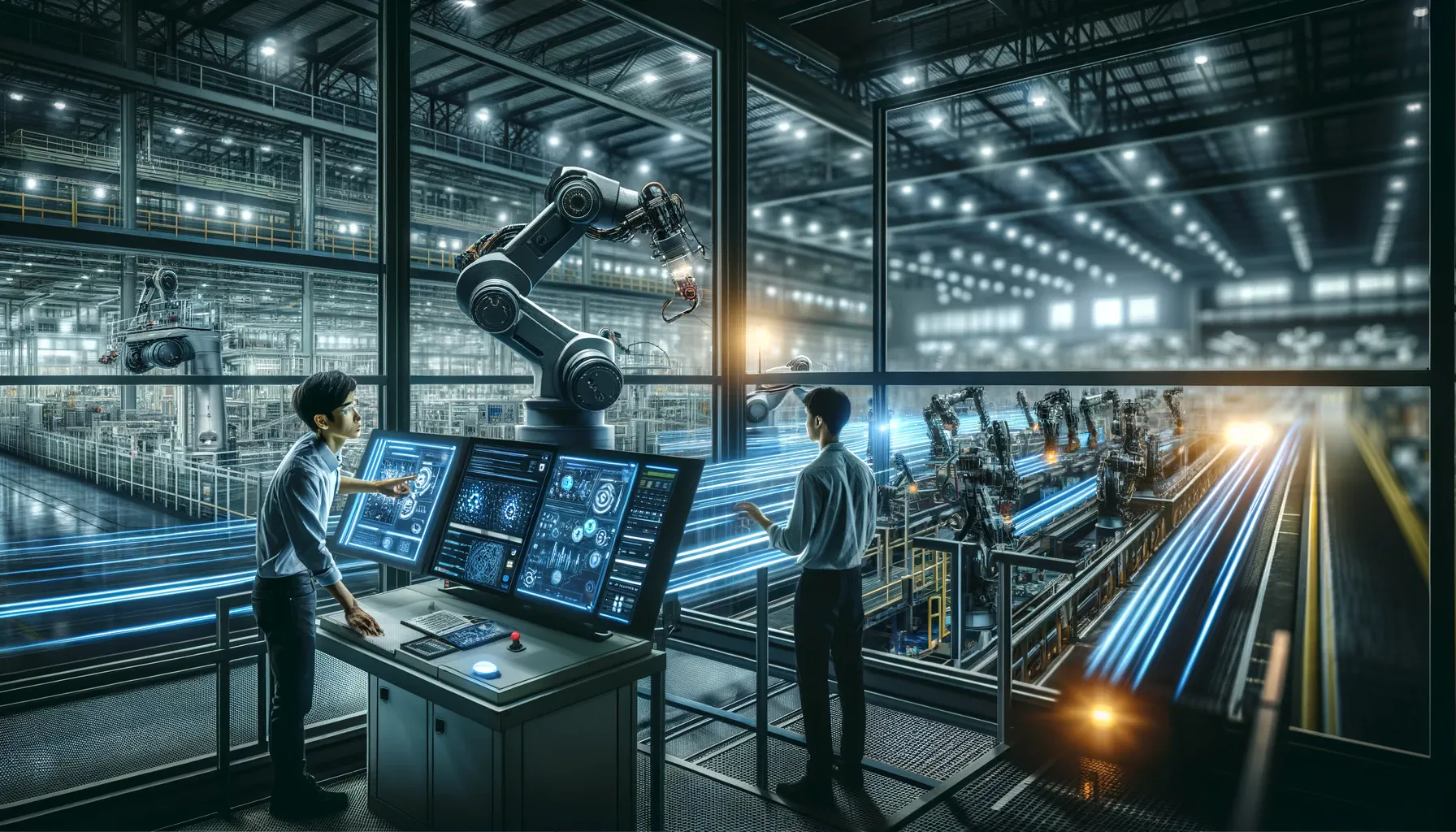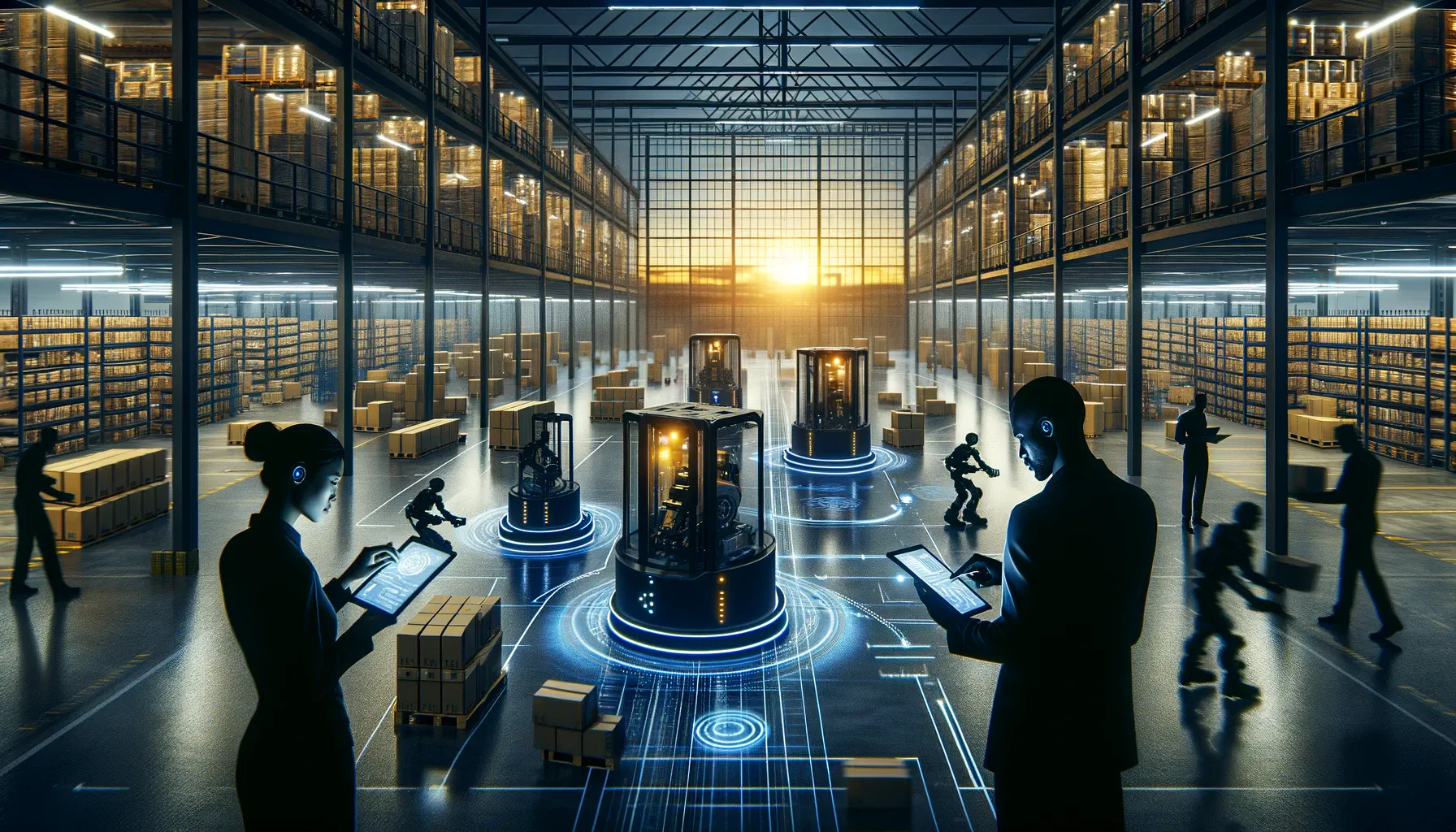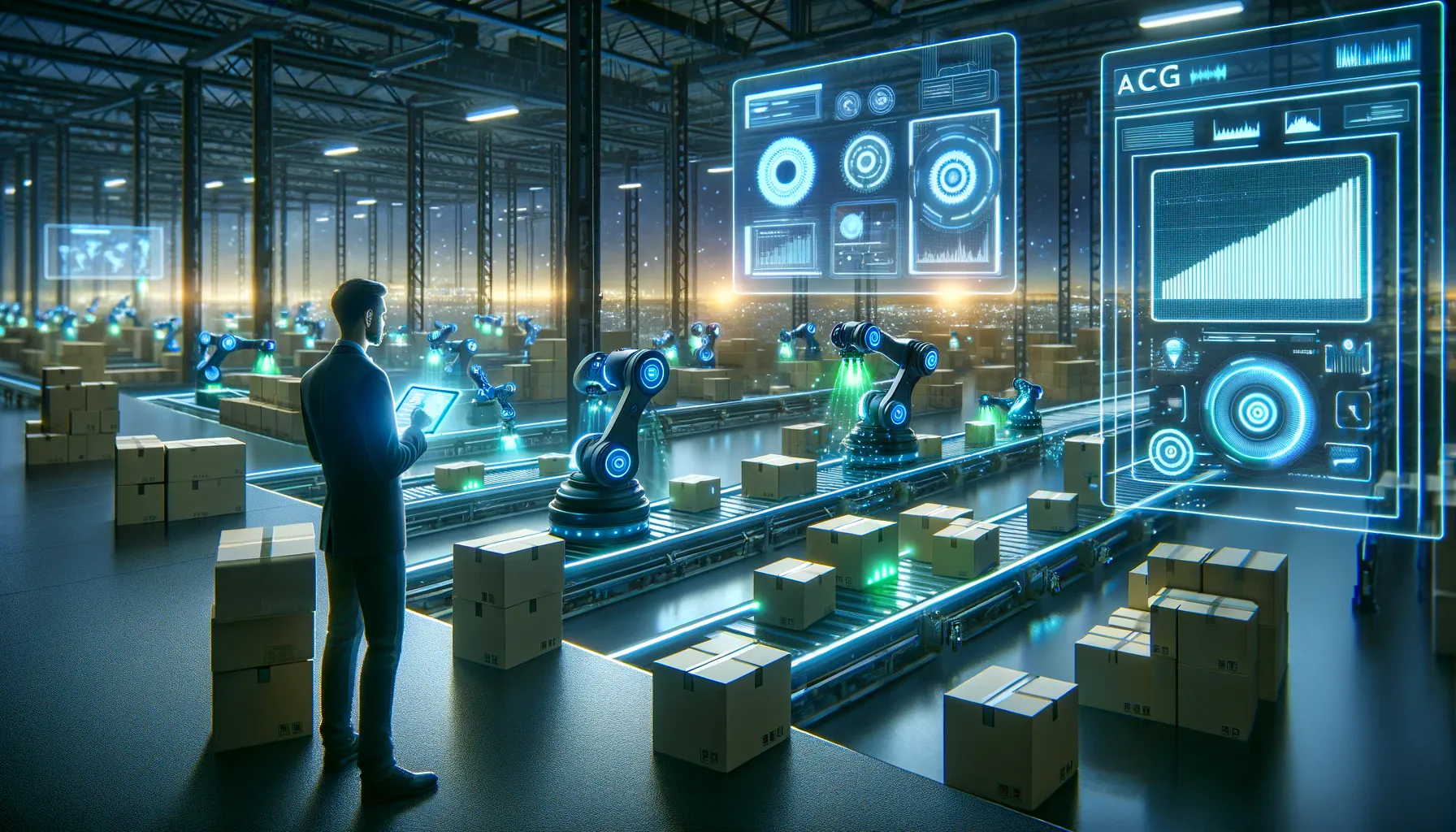Table of Contents
AI in FMCG enhances operational efficiency, decision-making processes, and overall performance. By leveraging AI technologies, FMCG companies can optimize supply chain management, improve demand forecasting accuracy, and enhance inventory control. Predictive analytics powered by AI aids in identifying market trends, enabling businesses to proactively adjust production and distribution strategies. This results in reduced costs minimized stockouts, and enhanced customer satisfaction through timely product availability.
Moreover, AI enables personalized marketing strategies in the FMCG sector, tailoring promotions, and advertisements based on consumer behavior analysis. This not only fosters stronger customer engagement but also boosts sales by delivering more targeted and relevant content.
Additionally, the implementation of AI in quality control ensures product consistency and minimizes defects during the manufacturing process. Through advanced image recognition and machine learning, FMCG companies can uphold quality standards, thereby building trust with consumers. In essence, AI in FMCG plays a pivotal role in fostering innovation and competitiveness within the industry.
AI in FMCG unlocks a spectrum of advantages, revolutionizing the sector through:

1. Demand Forecasting
AI in FMCG for demand forecasting involves the utilization of advanced algorithms to analyze historical sales data, market trends, and pertinent factors, enabling more precise predictions of future consumer demand. This application of artificial intelligence contributes significantly to optimizing inventory levels, mitigating stockouts, and minimizing instances of overstock.
By harnessing the power of AI, FMCG companies can enhance their forecasting accuracy, streamline supply chain operations, and ultimately improve overall efficiency in meeting market demands.
Nestle strategically utilizes AI in the FMCG sector for demand forecasting, enhancing the precision of predictions crucial for supply chain optimization and inventory management. Through the analysis of diverse factors and data sources, Nestlé harnesses the power of artificial intelligence to fine-tune its forecasting models.
This application allows the company to stay agile in responding to shifts in consumer demand, ultimately optimizing its supply chain processes and ensuring efficient inventory levels, thereby contributing to enhanced operational efficiency and customer satisfaction.
2. Supply Chain Optimization
In the realm of AI in FMCG, supply chain optimization emerges as a pivotal application. Leveraging advanced algorithms, AI contributes significantly to the enhancement of supply chain management. By meticulously optimizing delivery routes, ensuring optimal inventory levels, and pinpointing opportunities for cost reduction, AI facilitates a streamlined and efficient supply chain ecosystem.
The result is a notable improvement in overall operational efficiency, decreased lead times, and substantial cost savings. This strategic integration of AI technologies in supply chain processes underscores the transformative impact it can have on the FMCG sector, fostering resilience and competitiveness.
Procter & Gamble (P&G) stands out for its strategic application of machine learning algorithms in supply chain optimization. P&G harnesses the power of AI to meticulously analyze data, thereby bolstering the efficiency of its supply chain processes. Through this technological integration, the company strives to elevate forecasting accuracy, diminish lead times, and fine-tune inventory levels.
P&G’s commitment to leveraging AI underscores its dedication to staying at the forefront of innovation in the competitive landscape of fast-moving consumer goods.
3. Personalized Marketing
In the realm of AI in FMCG, personalized marketing stands out as a pivotal strategy. Through sophisticated analysis of consumer behavior and preferences, artificial intelligence empowers companies to craft highly tailored marketing approaches. This involves the implementation of personalized advertisements, finely-tuned product recommendations, and targeted promotions.
The result is a profound enhancement in customer engagement, fostering a more intimate connection with the audience. This personalized approach, facilitated by AI technologies, not only meets individual consumer needs more effectively but also drives a tangible boost in sales for FMCG businesses.
Unilever is actively exploring the integration of AI in FMCG, particularly in the realm of personalized marketing. Demonstrating a keen interest in leveraging advanced analytics and machine learning, Unilever seeks to refine its marketing strategies by tailoring them to individual consumer preferences.
This approach is designed to enhance the precision and relevance of content delivery, ensuring that consumers receive more targeted and personalized marketing messages. By harnessing the power of AI, Unilever aims to stay at the forefront of innovative marketing practices in the fast-moving consumer goods sector.
4. Dynamic Pricing
AI in FMCG has advanced algorithms that play a pivotal role in implementing dynamic pricing strategies. By scrutinizing market conditions, evaluating competitor pricing strategies, and closely monitoring customer behavior, these AI algorithms enable FMCG companies to make real-time adjustments to product pricing.
This dynamic pricing approach becomes a powerful tool for optimizing revenue and maintaining competitiveness in the fast-paced and ever-evolving consumer goods market. The utilization of AI in FMCG’s pricing strategies ensures a nimble response to market dynamics, fostering a more adaptive and fine-tuned approach to revenue optimization.

Amazon employs a dynamic pricing strategy driven by Artificial Intelligence (AI). Leveraging real-time market analysis, the company uses AI algorithms to monitor competitor prices, assess demand fluctuations, and track supply changes. The platform’s sophisticated AI systems also delve into customer behavior, considering factors like browsing history and purchase patterns to personalize prices for individual users.
Furthermore, AI aids in optimizing inventory management by predicting potential stockouts, and the company adjusts prices based on time of day, seasonality, and other contextual factors. Overall, Amazon’s use of AI in its dynamic pricing strategy is integral to staying competitive, maximizing sales opportunities, and providing a personalized shopping experience for its customers.
5. Quality Control
AI in FMCG, specifically in quality control, utilizes advanced image recognition and machine learning algorithms within the manufacturing process. By employing these technologies, companies can enhance their ability to scrutinize product quality and ensure adherence to rigorous standards.
The implementation of AI-driven quality control not only leads to a significant reduction in defects but also minimizes waste, contributing to improved efficiency and cost-effectiveness in the production cycle. This application of AI ensures a more precise and consistent evaluation of product quality, ultimately enhancing the overall reliability and reputation of FMCG brands.
Coca-Cola has expressed a keen interest in integrating AI and machine learning within its manufacturing processes to bolster quality control measures. Through the implementation of AI, the company aims to enhance its ability to detect defects and maintain stringent product quality standards. This strategic adoption of artificial intelligence reflects Coca-Cola’s commitment to leveraging cutting-edge technologies in the FMCG sector, specifically targeting improvements in quality assurance during the production phase.
6. Chatbots for Customer Service
In the realm of AI in FMCG, chatbots for customer service represent a transformative advancement. These AI-driven chatbots adeptly manage customer inquiries, furnish detailed product information, and facilitate seamless purchasing experiences. The integration of such technology not only elevates overall customer satisfaction by delivering swift and accurate responses but also significantly alleviates the workload on human customer service representatives.
This synergy of artificial intelligence and customer service not only ensures efficiency in addressing consumer queries but also contributes to a more streamlined and responsive engagement process within the fast-paced FMCG sector.
Mars, a prominent global confectionery, pet care, and food conglomerate, strategically utilizes AI in FMCG by incorporating chatbots for customer service. These intelligent chatbots play a pivotal role in enhancing customer interactions, operating seamlessly on websites and messaging platforms.
Mars employs this technology to efficiently address customer inquiries, deliver product information, and provide valuable support. The implementation of AI-driven chatbots aligns with Mars’ commitment to leveraging innovative solutions in the FMCG sector to optimize customer engagement and elevate the overall consumer experience.
7. Predictive Maintenance
AI in FMCG, specifically in predictive maintenance, involves leveraging advanced algorithms to anticipate potential equipment failures and schedule proactive maintenance activities. This application of artificial intelligence is instrumental in preventing unplanned downtime, consequently minimizing disruptions to manufacturing processes.
By foreseeing maintenance needs, companies can effectively reduce associated costs and enhance operational efficiency, ensuring the continuous and uninterrupted functioning of their facilities.
Mondelez, a prominent multinational food and beverage company recognized for brands such as Oreo and Cadbury, is actively exploring the integration of AI in FMCG for predictive maintenance initiatives. By expressing a clear interest in leveraging AI technologies, Mondelez aims to enhance its maintenance processes through predictive analytics.
The implementation of AI in predictive maintenance holds the potential to anticipate equipment failures, optimize maintenance schedules, and reduce downtime. This strategic move aligns with Mondelez’s commitment to adopting advanced technologies for operational efficiency and ensuring the smooth functioning of its manufacturing facilities.
8. Market and Competitive Analysis
AI in FMCG facilitates a comprehensive market and competitive analysis by processing extensive data from diverse sources. It delves into market trends, consumer behavior, and competitive landscapes, offering invaluable insights for strategic decision-making. This technological approach enables companies in the Fast-Moving Consumer Goods sector to gain a nuanced understanding of their market positioning, anticipate shifts in consumer preferences, and respond adeptly to dynamic competitive environments.
By harnessing the analytical power of AI, FMCG businesses can make informed choices that enhance their market presence and ensure a proactive stance in an ever-evolving industry landscape.

Kraft Heinz, a prominent player in the global food and beverage industry, has showcased a keen interest in harnessing the power of AI in FMCG for market analysis. With the integration of AI technologies, companies like Kraft Heinz can delve deeper into comprehensive market insights, gaining a nuanced understanding of evolving trends, consumer behavior patterns, and the competitive landscape.
The utilization of AI tools enables more sophisticated and data-driven decision-making processes, empowering FMCG companies to stay agile in response to market dynamics and consumer preferences. This strategic embrace of AI underscores Kraft Heinz’s commitment to leveraging cutting-edge technologies for a more insightful and competitive approach to navigating the ever-evolving FMCG sector.
9. Sustainability and Environmental Impact
Leveraging AI in FMCG, specifically in the realm of sustainability and environmental impact, holds immense potential for optimizing resource utilization and minimizing waste throughout the production and distribution cycles. Artificial Intelligence technologies enable precise analysis and forecasting, facilitating smarter decision-making in areas such as inventory management and supply chain optimization.
By harnessing AI capabilities, FMCG companies can enhance their commitment to environmental sustainability by identifying opportunities to reduce carbon footprints, minimize excess production, and streamline distribution channels. This integration of AI not only improves operational efficiency but also aligns with broader initiatives aimed at fostering a more sustainable and environmentally responsible FMCG sector.
Danone, a multinational food-products corporation recognized for its prominent brands such as Evian and Activia, emphasizes sustainability and environmental responsibility in its operations. While explicit information on their utilization of AI in FMCG may not be explicitly disclosed, Danone has demonstrated a commitment to minimizing its environmental footprint throughout the supply chain and operational processes.
The company’s initiatives align with the broader industry trend of integrating AI technologies to enhance efficiency, optimize resource utilization, and achieve sustainability goals in the fast-moving consumer goods sector.
10. Employee Productivity
The integration of AI in FMCG is revolutionizing employee productivity by automating routine tasks, and liberating valuable time for staff to concentrate on strategic and value-added activities. This not only enhances overall productivity but also contributes to heightened job satisfaction among employees.
The deployment of AI tools streamlines operational processes, allowing workforce efforts to be redirected toward tasks that require human expertise, creativity, and strategic thinking. This transformation in task allocation fosters a more efficient and satisfying work environment within the FMCG sector.
Kraft Heinz, a multinational food and beverage company in the FMCG sector, may have strategically integrated AI applications to optimize employee productivity. Recognizing the significance of innovation in streamlining operations, FMCG companies like Kraft Heinz leverage AI technologies to enhance workforce efficiency. Whether through predictive analytics, automation, or intelligent decision-making tools, the implementation of AI in FMCG reflects a commitment to staying at the forefront of operational excellence.
The consideration or adoption of AI by Kraft Heinz aligns with the industry’s broader trend of embracing cutting-edge solutions to drive productivity and remain competitive in a dynamic market landscape.
11. Fraud Detection
AI in FMCG plays a pivotal role in bolstering business integrity, particularly in the domain of fraud detection. Leveraging sophisticated algorithms, companies can employ AI to scrutinize various facets, including supply chain transactions, thereby enhancing vigilance against fraudulent activities. This strategic use of AI contributes to safeguarding the integrity of FMCG business operations, ensuring a more secure and transparent operational environment.

Mars, a prominent global conglomerate in confectionery, pet care, and food products, boasts a diverse portfolio. Although explicit details regarding Mars’ utilization of AI for fraud detection remain elusive, it is in line with a broader trend among major FMCG companies. These industry leaders consistently demonstrate a commitment to technological advancements, investing in cutting-edge solutions for diverse operational facets such as security and risk management.
In the FMCG sector, the integration of AI aligns with the pursuit of enhanced efficiency, precision, and resilience in addressing operational challenges and ensuring the integrity of business processes.
Conclusive Outlook to the Impact of AI in FMCG
The integration of AI in the FMCG sector demands meticulous planning and seamless integration with current systems. The successful incorporation of AI technologies positions companies at the forefront of innovation, providing a distinct competitive advantage. By enhancing operational efficiency, minimizing costs, and elevating customer satisfaction, these forward-thinking businesses are poised to navigate the evolving landscape of the Fast-Moving Consumer Goods industry with agility and strategic prowess.
The strategic deployment of AI in FMCG represents not merely a technological evolution but a transformative leap toward sustained competitiveness and heightened customer-centricity.